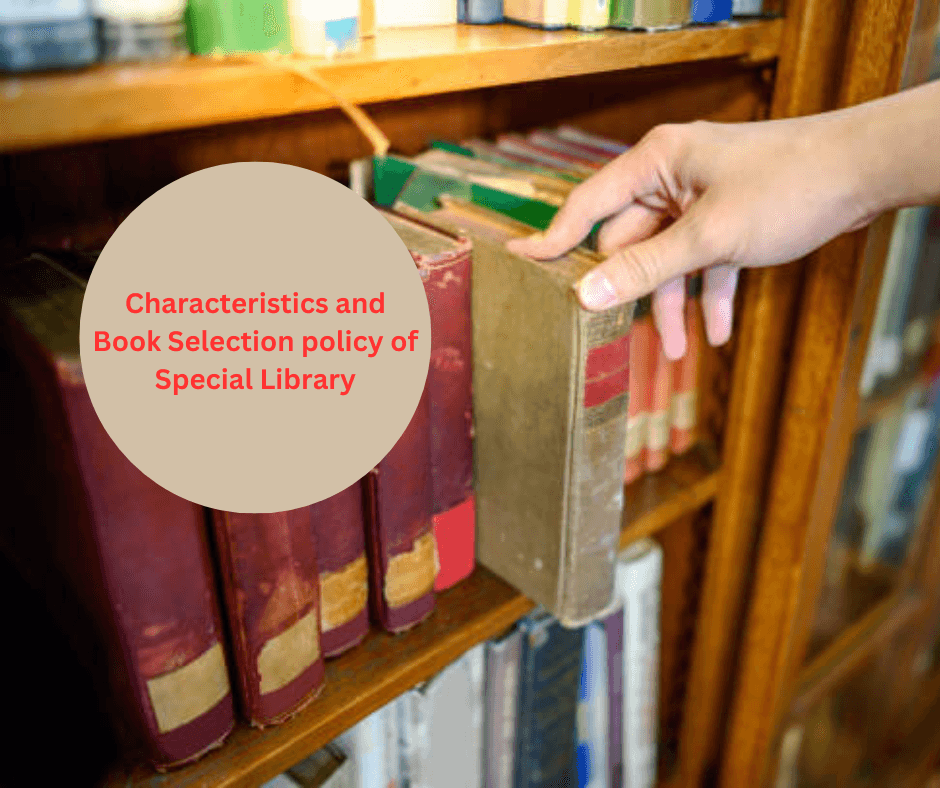A special library is a distinctive type of library committed to providing a wealth of specialized resources, services, and collections carefully curated around a particular subject, profession, or demographic segment. Unlike public or academic libraries, which serve a broader audience, special libraries focus intently on the unique needs of their users, offering materials that often cannot be found in other library settings.
Key Characteristics of Special Libraries:
1. Focused Collection:
Special libraries focus on a specific area of expertise, such as law, medicine, business, engineering, or government, and curate their collections to meet the specialized needs of their target audience. The materials they house are meticulously selected for their relevance and utility, ensuring that users have access to highly specialized, authoritative, and up-to-date resources tailored to their field of interest or profession.
2. Targeted Users:
Special libraries cater to a defined group of users, such as corporate employees, academic researchers, or members of professional organizations, tailoring their resources and services to meet the specific needs of their audience. By understanding their users’ requirements, these libraries provide targeted support that enhances research, decision-making, and professional development within their specialized fields.
3. Specialized Services:
Special libraries offer specialized and tailored services such as personalized research assistance, access to exclusive databases, and the delivery of curated content designed specifically for their users. These distinctive services enable efficient and in-depth exploration within specialized fields, empowering users to access precisely the information they need to support their research, projects, or professional goals.
4. Unique Resources:
Special libraries house unique resources such as rare books, technical reports, patents, archival documents, and proprietary databases, offering access to materials not typically available in standard libraries. These specialized collections serve as a treasure trove of information, supporting advanced research and fostering deeper knowledge within specific disciplines, making them invaluable for academic, professional, and niche inquiries.
5. Expert Staff:
The expert staff in special libraries is highly knowledgeable and often possesses advanced expertise in their specific subject areas, enabling them to provide informed and tailored support to users. Their specialized training equips them to navigate the complexities of the library’s unique resources effectively, ensuring that users can access and utilize the information most relevant to their needs.
6. Non-Circulating Collections:
Many special libraries maintain collections that are non-circulating, meaning that materials are not available for loan. Instead, these resources are designed for in-library use or are one-of-a-kind items that are preserved for unique research purposes, ensuring their availability for future generations.

Examples of Special Libraries:
Here are five renowned special libraries from around the world, each notable for its unique focus and specialized collections:
1. The British Library Business & IP Centre (BIPC) – London, UK
This center emphasizes business, entrepreneurship, and intellectual property, offering resources and support for startups and innovators.
2. The National Library of Medicine (NLM) – Bethesda, Maryland, USA
The world’s largest biomedical library, NLM provides access to medical literature, research, and historical health-related collections.
3. The New York Public Library (NYPL) Schomburg Center for Research in Black Culture – New York, USA
This center is a leading institution for the study of African American, African Diaspora, and African history and culture.
4. The Vatican Library – Vatican City
It houses an extensive collection of ancient manuscripts, rare books, and significant historical documents relevant to religious and cultural studies.
5. The Linda Hall Library – Kansas City, Missouri, USA
This library specializes in science, engineering, and technology, providing resources for researchers, students, and industry professionals.
Collections of Special libraries
Special library collections encompass a variety of materials tailored to meet the unique needs of their audience. These include rare books and manuscripts, which offer historical insights and unique content often unavailable elsewhere. Archival materials such as letters, diaries, and institutional records preserve primary sources for in-depth research. Libraries may also house audiovisual media like recordings, photographs, and films, along with technical reports, patents, and standards essential for specific industries. Additionally, collections often include digital resources, such as specialized databases, e-books, and electronic journals, providing convenient access to up-to-date information in the library’s focus area.
Users of Special libraries
Special libraries serve individuals and groups needing specialized information tailored to specific fields or industries, including professionals like lawyers, doctors, engineers, and business executives who rely on these libraries for technical reports, legal precedents, and industry-specific resources. Researchers, academics, and students in specialized fields use these libraries for access to rare books, manuscripts, and exclusive databases, while corporate employees benefit from resources that support market research, business intelligence, and innovation. Government officials, policymakers, historians, and archivists also depend on special libraries for legislative research, policy analysis, historical documents, and archival materials essential to their work.
Special Library Book Selection:
Since special libraries develop interest in a subject or a topic of poetry, specific subject-based collections are created. In addition to special or specific subjects, sometimes subjects related to or related to the subject are included in the collection. Special libraries are established in research institutions, organizations, commercial organizations, professional associations, various government departments, etc. The library is operated as the main information center of the institution. Only those who are related to the institution can use it for the needs of the institution.
Selection Policy:
- The library collection depends on the objectives and functions of the institution, and the selection policy is stated in accordance with the objectives of the library.
- The depth and breadth of the subject matter depend on the nature of the organization’s work.
- The collection of subjects is as deep and extensive as needed.
- In addition to meeting immediate and current needs, the nature of future needs is determined, and procurement is developed accordingly.
- While specialized collections are preferred, core collections should be developed on a broad basis.
- Arrangements should be made to meet the specific and special needs of the reader.
- Subject matter experts are included in the book selection committee and provide expert advice.
Since a special library is the main information center of an institution, libraries and information centers are appropriately developed in the interest of the institution. Sometimes, when special needs are outside the subject, they are met through interlibrary transactions. For this, connections are maintained with other libraries so that help from other planets can be obtained if necessary. Providing the latest information about the institution is one of the tasks. Currently, one librarian connects with another library through the Internet and collects the necessary information from that library. This type of information communication management is effective in international affairs.



